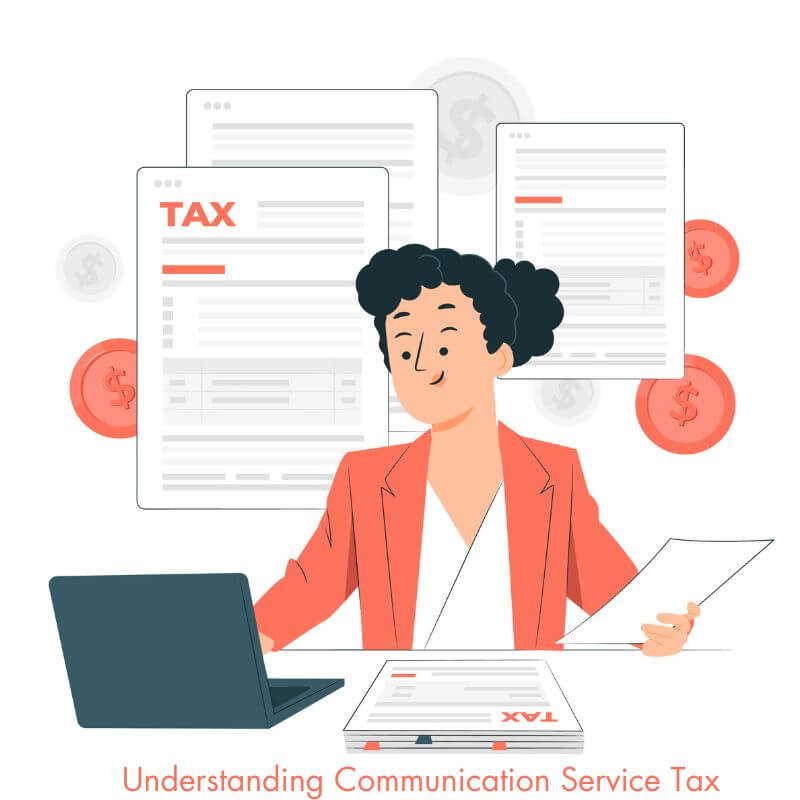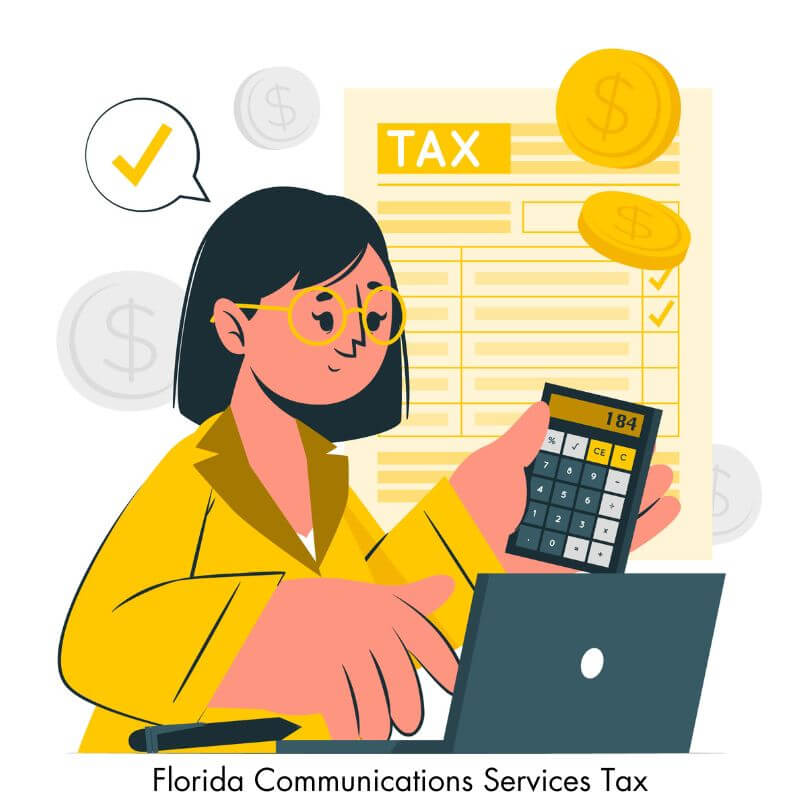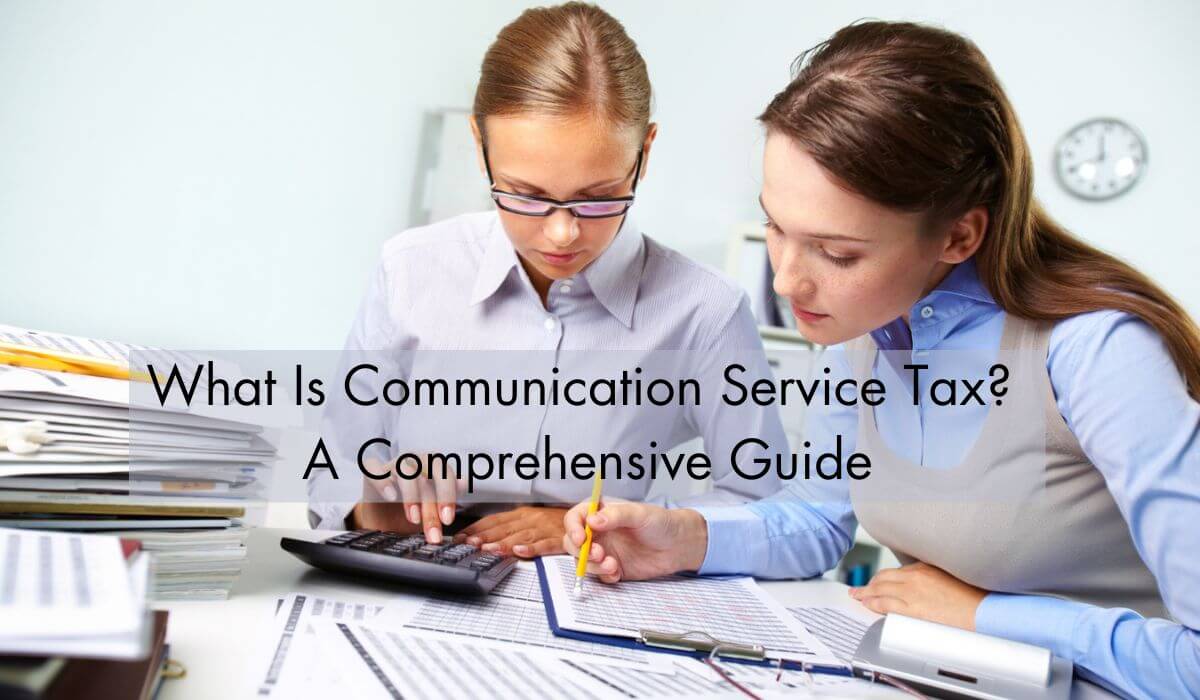Last Updated on June 23, 2024 by Amrita
Today, businesses are constantly evolving and adapting to keep up with the latest trends and technologies. This includes offering various forms of communication services such as VoIP, streaming, and digital communication offerings. However, with these advancements comes the complexity of taxes like the Communication Service Tax (CST).
In this comprehensive guide, I will tell you what CST is, who is responsible for it and how businesses can ensure compliance while leveraging the power of tax automation, along with some other important discussions.

Read Also: What Is Berkheimer Tax? A Comprehensive Guide
Key Takeaways:
- CST is a tax levied on the revenues generated by businesses providing specified communication services.
- Businesses that offer or use communication services are impacted by CST, including telecommunications companies and colocation facilities.
- With advancements in technology, digital transformation plays a significant role in the complexity of CST regulations for businesses.
- The landscape of CST regulations is constantly evolving, requiring businesses to stay updated and compliant.
- Recently, there have been two shifts in CST regulations that impact businesses: the inclusion of various sectors using digital communication offerings and the expansion of tax boundaries.
- To ensure compliance with CST, businesses can leverage tax automation solutions to streamline their processes and stay up-to-date with changing regulations.
- Despite its complexities, understanding CST is crucial for businesses to avoid penalties and maintain financial stability. By staying informed and utilizing available tools, businesses can navigate the ever-changing landscape of CST regulations while continuing to provide valuable communication services to their customers.
Understanding Communication Service Tax
What is CST?
Communication Service Tax (CST) is a tax levied on the revenues generated by businesses providing specified communication services.
This can include traditional services like landlines and broadcasting, as well as more modern forms of communication such as VoIP. The primary purpose of CST is to generate revenue for local, state, and federal governments while also regulating the use of communication services.
Impact On Businesses
Businesses that offer communication services or use them as part of their operations are heavily impacted by CST. For example, telecommunications companies must keep track of the tax rates and regulations in the various jurisdictions where they provide services.
This can be a complex and time-consuming process, especially for larger companies with operations in multiple states or countries.
Moreover, businesses may also be liable for collecting and remitting CST on behalf of their customers. For instance, colocation facilities that rent out space and bandwidth to businesses must collect and remit taxes on their services, which can add an extra layer of complexity to their operations.
Role In Digital Transformation
CST also plays a significant role in the ongoing digital transformation of industries. As technology continues to advance, businesses are increasingly relying on communication services such as software-defined networking (SDN) and satellite services to connect with customers and partners across larger distances.
These technologies often come with their own set of CST regulations, adding another layer of complexity for businesses to navigate.
The Shifting Landscape Of Communication Service Tax Regulations
The landscape of communication service tax regulations is constantly evolving, and businesses must stay updated to ensure compliance. In recent years, there have been two significant shifts in these regulations that have directly impacted businesses.
The first shift involves companies from various sectors such as automotive, manufacturing, and healthcare who are now subject to CST due to their use of digital communication offerings.
The second shift includes the expansion of tax boundaries beyond traditional services, leading to a broader range of businesses falling within the scope of CST regulations.
Read Also: What Is A Per Capita Tax? | An Informative Guide
Types Of Communication Services
CST can be applied to a variety of different communication services depending on the jurisdiction. Some common ones include:
- Voice Calls: This involves using a traditional landline or mobile phone to make calls.
- Text Messaging: Tax is applied to both domestic and international text messages.
- Internet-Based Communication Services: This includes services such as email, instant messaging, and video conferencing.
- Cable and Satellite TV: Some local governments may impose a tax on cable or satellite television services.
- VoIP (Voice over Internet Protocol): This refers to making phone calls over the Internet, and tax is typically applied at the state and local level.
- Streaming Services: With the rise of streaming platforms like Netflix and Hulu, some states have started imposing a tax on these services as well.
Who Is Liable For Communication Service Tax?
Most businesses may not be aware that they are liable for communication service tax, as it often extends beyond traditional telephone, cable, and broadcasting services.
If your company offers digital communication offerings, VoIP, or streaming services, it may fall within the tax regulations for CST. This highlights the critical role that tax compliance plays in an organization and emphasizes the need for businesses to stay updated on changing regulations.
How Automation Can Help?
The Power Of automation In Reducing Audit Risk
With the ever-changing landscape of tax laws and regulations, it can be easy for businesses to fall out of compliance. This not only puts them at risk for audits but also potential penalties and restrictions on their operations.
However, by embracing automation technology, businesses can greatly reduce their audit risk. By automating tax calculations and tracking, businesses can ensure accuracy and precision in their tax compliance efforts.
This not only saves time and resources but also minimizes the chances of costly errors that could trigger an audit.
With accurate and up-to-date databases, businesses can stay on top of changing tax laws and regulations, mitigating their risk for non-compliance. By embracing automation, businesses can proactively reduce audit risk and ensure smooth operations.
That’s the power of technology in safeguarding businesses against the risks of non-compliance. Lastly, automation also allows for easier data retrieval and analysis, making it easier to address any potential issues before they escalate into full-blown audits.
Leveraging Tax Automation For Strategic Advantages
Many businesses view tax automation as a means to simply comply with tax laws and regulations. However, the true value of tax automation lies in its ability to transform tax departments from tactical necessities to strategic partners within an organization.
By automating labor-intensive tasks such as CST calculations, companies can free up valuable resources and redirect them towards more strategic initiatives.
This includes activities such as analytics, strategic planning, tax forecasting, and optimizing the organization’s overall tax profile.
Through these shifts in focus and utilizing the power of tax automation, businesses can achieve significant growth while maintaining compliance.
It is crucial for companies to stay updated on the constantly evolving landscape of local and state CST regulations and consider leveraging tax automation as a means to minimize audit risk and add strategic value to their organizations.
With Vertex’s comprehensive tax technology solutions, businesses can effectively navigate the complexities of tax compliance and unlock the full potential of tax automation for their strategic advantage.
So, it is clear that leveraging tax automation goes beyond just compliance, it enables businesses to strategically plan for growth and success in today’s complex tax landscape.
Understanding CST For Different Types Of Companies In Detail
Communications tax is a complex and constantly evolving area, with different rules and rates applying to various types of companies. In this part, I will share the specific types of businesses that may be subject to communications tax and the challenges they face in complying with these regulations.
MSPs: Navigating Multiple Services And Tax Jurisdictions
Managed Service Providers (MSPs) provide a range of IT services to clients, including cloud computing, data storage, and network management. These services often involve the use of telecommunications, making MSPs subject to communications tax in many jurisdictions.
MSPs face unique challenges when it comes to complying with communications tax regulations. As they offer multiple services, each may be subject to different tax rates and rules in various jurisdictions.
This can make it difficult for MSPs to accurately calculate and collect the correct taxes from their clients.
To add to the complexity, many MSPs operate in multiple states or even countries, further complicating their communications tax obligations. This requires them to constantly stay updated on changes in regulations and ensure they are accurately collecting and remitting taxes.
CPaaS Providers: Managing CPaaS Taxes And Communications Tax
Communications Platform as a Service (CPaaS) providers offer cloud-based communication services to businesses, allowing them to easily integrate voice, video, and messaging into their applications.
As with MSPs, these services often involve the use of telecommunications, making CPaaS providers subject to communications tax.
The challenge for CPaaS providers lies in the fact that their services often include both telecommunications and other non-taxable components. This makes it difficult to determine which portion of their service is subject to communications tax, leading to potential under or over-collection of taxes.
In addition, as these providers operate in multiple jurisdictions and offer various types of services, they must navigate a complex web of regulations and tax rates to ensure compliance.
Colocation Facilities: Facing Tax Liability On Behalf Of Customers
As mentioned earlier, colocation facilities provide rental space, power, and bandwidth for servers and other computing hardware. These facilities may also use telecommunications services, such as internet connectivity and phone lines, making them subject to communications tax.
However, what sets colocation facilities apart is the fact that they are often liable for taxes not only on their own usage of telecommunications services but also on behalf of their business customers.
This means colocation facilities must carefully track and calculate the communications tax obligations of each customer, adding another layer of complexity to their compliance efforts.
SDN And SD-WAN Providers: Navigating Changing Regulations
Software-defined Networking (SDN) and Software-defined Wide Area Network (SD-WAN) providers offer cloud-based solutions for network infrastructure management. As these services involve the use of telecommunications, they may also be subject to communications tax.
However, the challenge for SDN and SD-WAN providers lies in the fact that regulations and tax rates in this area are constantly evolving.
Tax authorities and regulatory agencies are taking a closer look at these services, potentially leading to enforcement actions and changes in tax obligations. This means SDN and SD-WAN providers must stay updated on these developments to ensure compliance.
Overview Of Florida Communications Services Tax

The Florida Communications Services Tax (CST) is a tax imposed on the sale of communications services in the state of Florida. This includes a wide range of services such as cable and satellite television, video and music streaming, telephone (including VoIP), mobile communications, and more.
It is important for dealers to properly collect, report, and pay the tax to the Florida Department of Revenue, as well as for customers to understand their responsibility in paying the communications services use tax if it is not collected by the dealer.
Taxable Communications Services
According to Florida state law, all sales of communications services are generally subject to taxation unless specifically exempt. This includes any type of voice, data, audio, video, or information transmitted through any medium.
Some examples of taxable communications services include local, long-distance, and toll telephone service; VoIP; video programming (such as cable or streaming); satellite TV; mobile communications; private line services; and more. It is the responsibility of dealers to correctly identify and collect taxes on these services.
Exemption For Communication Services
Now it is also important for dealers to understand what transactions are exempt from taxation. This means that these sales do not require taxes to be collected by the dealer.
Some examples of exempt transactions include sales made for resale by a registered dealer with proper documentation, purchases of Internet access and related services used for providing Internet access, sales to federal agencies, the state, or any other political subdivision.
Additionally, exempt sales also include those made to religious and educational organizations with 501(c)(3) status, as well as homes for the aged that have 501(c)(3) status and meet certain provisions.
It is crucial for dealers to be aware of these exemptions in order to avoid collecting taxes on transactions that are not subject to the Florida Communications Services Tax.
The Benefits Of Staying Compliant With CST Laws
Apart from avoiding audits and potential penalties, staying compliant with communication tax laws offers several additional benefits for businesses.
By keeping up with changing regulations, companies can accurately assess their tax liabilities and avoid overpayment. This can result in significant cost savings for businesses, especially those operating on a large scale.
Additionally, staying compliant with CST laws ensures that businesses maintain a positive reputation and trust with customers and stakeholders.
Non-compliance can lead to negative publicity and potential damage to the organization’s brand image. By prioritizing compliance, companies can uphold their reputation and maintain a competitive edge in the market.
Learn More Guide:
- Tax Implications Of Selling A House Below Market Value
- Tax Consequences Of Transferring Property To LLC
- Short Term Rental Tax Loophole: Maximize Your Tax Savings
- Do Amish People Pay Taxes? Explore Step By Step
- Is Child Support Tax Deductible? An Informative Guide
Reference:
https://floridarevenue.com/taxes/taxesfees/Pages/cst.aspx
https://www.revenue.nh.gov/transparency/communications.htm
Conclusion
So, communication service tax is a crucial aspect of using various communication services and generating revenue for governments. Businesses must understand and comply with these tax laws to avoid penalties and maintain their reputation.
By leveraging automation solutions, businesses can streamline their compliance processes, stay updated with changing regulations, and focus on providing quality services to their customers.
So the next time you make a phone call or stream your favorite movie, remember that CST is an essential part of the entire process. So stay informed and compliant to ensure a smooth and hassle-free experience.
